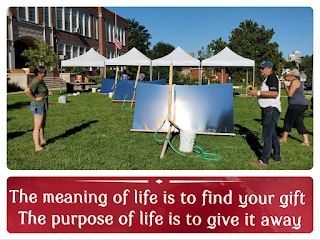#Count who's with you and your story. Count who's not. Help get the latter to join the former, in their interest, with the least energy consumed by you.
"Everything happens for a reason."
(It took me a long time to hear it. It was in South Texas, some 18 years ago, as I had just landed for the interview for my first full time tenure track professor and director position, the one that helped build the case for my later becoming a U.S. Citizen. Note yesterday's [5] question. This is in part a case study on how that counting should be done.)
Life is indeed a Ponzi scheme. The world is clearly one too. Yet: good news is there is not just one Ponzi scheme. But plenty!
Choose the Ponzi schemes you're a part of. Design and run _your own_ all positive all life and world changing Ponzi schemes. Make everyone participate in these great schemes & abandon the nasty ones they've been believing in (erroneously!) for far too long.
I _had to_ get to Texas. I had to learn Texas, to know it in some depth, to live it and to love it, to meet everyone I met and have been influenced by there, to make new amazing lifelong friends, to run into My Dear Bride, of course, but most of all, to _learn to proactively dismantle stereotypes_.
I had to get to Texas, in 2004, it turns out, because when I was a teenager my parents brought me (from Hungary, of all places) a University of Texas branded T-shirt. What a courageous crazy thing, in retrospect, to wear that in the late 1970s, early 1980s, România. Notice how _I believed that story_, in spite of everything surrounding me telling me I shouldn't have. Notice how stereotypical views of Texas hit me in both positive (University of Texas brand & lure, Texas Instruments) and negative (politics & more) ways over time. Notice how some stories have endurance in our minds, if subconsciously so. Notice how learning to dismantle stereotypes is about people. It is about interacting with, learning to know, & trusting people. Day in and day out. (More about this later in our own 6D model—always go slow, and you'll learn much more.)
At first I thought about it—the sentence above—in the context I was in the middle of back then. (Suffice it to say I had to learn that moving was going to matter a lot.) But there was so much more to the lesson. As you can see here and now. The great thing about good lessons is that once learned they stay with you.
"When you'll get it [the doctoral degree], you'll know that it's just the ticket to get you into the ballroom. What you'll do on the dance floor is what matters."
My lady mentor of 28 years & dissertation co-chair couldn't have framed it better.
Take _it_ to mean _your own learning_ of what matters. _To build an ability & to have a desire to make a difference._
Let's watch systems thinking. Ask _your own questions_. We can answer some together if you list them below.👇
In memory of Donald T Campbell and Paul Y Hammond.🙏
Follow in the footsteps of the great.
Look inside.
Repeat.
[6]
I don't have proof of this but I believe strongly that this is the book Russell Ackoff speaks about in his first sentence in his talk above.
Please note that there is someone relatively (wannabe) famous in these parts of the world who is (should never) formally connected with (and hence know about) Russell Ackoff more than he ever shows.
We know that from the misters person's much too immodest behavior and much too influential ill reasoning. Who do you think the person is? What can be done to curb said sad trend—that all too many listen to erroneously gathered false fame?
Please _also_ note that yesterday I told the story of how Russell Ackoff helped solve inner city Philadelphia "learning to read by attracting folks to watch Charlie Chaplin old no-sound movies" in the context of making that part of Yates, then Yates Nebraska, and then Yates USA.
I told it on the way to testifying to the Nebraska Legislature to someone who helped me watch The Goonies in my 50s.
We'll make this happen, from here in Gifford Park, to the entire country and the world. Let me know if you want to help. Thank you.
Adrian S. Petrescu, Ph.D., J.D.
Chief Future Architect, InnovationTrek
We got here. What's next?
Accelerate Innovation.
In companies and self.
Grow flow. Naturally.
ASPetrescu@InnovationTrek.org




